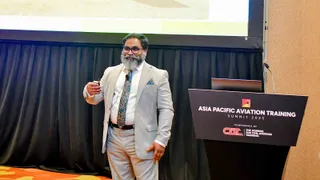Moving Beyond Temporary Layoffs and Pay Cuts
Contact Our Team
For more information about how Halldale can add value to your marketing and promotional campaigns or to discuss event exhibitor and sponsorship opportunities, contact our team to find out more
The Americas -
holly.foster@halldale.com
Rest of World -
jeremy@halldale.com

Group Editor Marty Kauchak reports on how CAE is positioning itself for the next S&T business upturn.
This23 March, CAE participated in an RBC Capital Markets-moderated webcast aboutthe COVID-19 situation and its impact. Halldale Group joined the webcast andreports on key comments during the event from Marc Parent, CAE’s President andChief Executive Officer, Sonya Branco, CAE’s Chief Financial Officer, andAndrew Arnovitz, CAE's Vice President, Strategy and Investor Relations.
Parent set the stage for the webinar by noting the speed and magnitude of the COVID-19 pandemic has caused “a very dramatic disruption to the civil aviation transportation system” that while “very great, we definitely believe it will be temporary.” As the precise duration of this crisis remains unknown to CAE and the broader community, the company is taking immediate actions to fiscally protect itself and its stakeholders to include: cutting capital expenditures to minimal levels; and reducing operating expenses, to include temporary layoffs of unionized manufacturing employees, and across-the board salary cuts – from Parent through the lower ranks of the company. “Additional temporary layoffs locally and around the world are inevitable and will follow in short order, in the coming days, and these will be across the board as well,” he emphasized.
Beyond a focus on operating expenses, CAE is also taking additional steps to reduce other costs and match operating levels to decreased demand. To that end, Parent added, “we expect minimal investment in our training network as we expect fewer orders from airlines. Nothing is off the table.”
Parent and Branco then provided a 101-level discussion about training system acquisition, noting that due to upfront deposits required at the time of contract signing, it is rare that a customer cancels a simulator order.
The CAE President and CEO continued, “We have a large backlog of simulator orders, and those are funded through customer deposits. For a company to cancel it is quite rare, because they need them, perhaps later – and we have a few, not many, airlines who ask us to move the order ‘to the right’.”
Offering a glimpse of light at the end of an increasingly bleak tunnel for a beleaguered community, Parent revealed that within the last week, CAE received “two new full flight [FFS] orders, from a customer in China, another in Singapore. When I see that, they clearly see this is a temporary, although very grave, issue.”
CAEreported 50 of its civil aviation global training locations were open forbusiness, with others in different states of closure due to host-nations’ government-mandatedshutdowns. Not unexpected, Arnovitz reported Asia is “opening up somewhat”.While CAE navigates a 14-day quarantine in effect in Singapore, “which ismaking third-party training there more difficult, but with the center stilloperating,” the training center in Cebu, Philippines is temporarily closed, whilethe Kuala Lumpur center has recently reopened. Other CAE training centershutdowns have mirrored the progress of the pandemic around the globe. WhileCAE also had to close its center in Lima, Peru, “one of the biggest challengeswe’re facing at the moment are in Europe – and, so far, centers which have beentemporarily closed are Brussels and Milan.” All training centers in NorthAmerica remain open.
CAEhas also observed a decrease in business aviation activity, due to a reductionin overarching business demand in someregions, further heightened by border restrictions. “We’re seeing issues mainlywith getting customers themselves to the training sites because of quarantine.All of our business aircraft training centers are operating. While the demandhas gone down, what we’re seeing now is a recurrent training demand – driven byregulations. But considering the circumstances, we’re seeing a good level ofactivity.”
Parent then digressed to state the imperative for civil sector aircrews to train, even though flights are being cancelled and other operational reductions are occuring. “This is a regulated business. Even if airlines are flying at reduced levels, they have to train. Depending on the country they need to train every six to nine months.” While, during this period of crisis, some governments, for instance in Europe, are providing leeway to the airlines to temporarily postpone check-out training due to the inability of aircrews to access training centers, the aircrews will eventually need to complete center-delivered training.
CAE also reported an approximate C$4 billion backlog in its defense business. Noting the company’s defense business model has continued to evolve to increasingly offer services around the globe, Parent concluded, “Longer term, we don’t see a structural impact on defense. But we can anticipate some short-term friction as we move through this period.”


